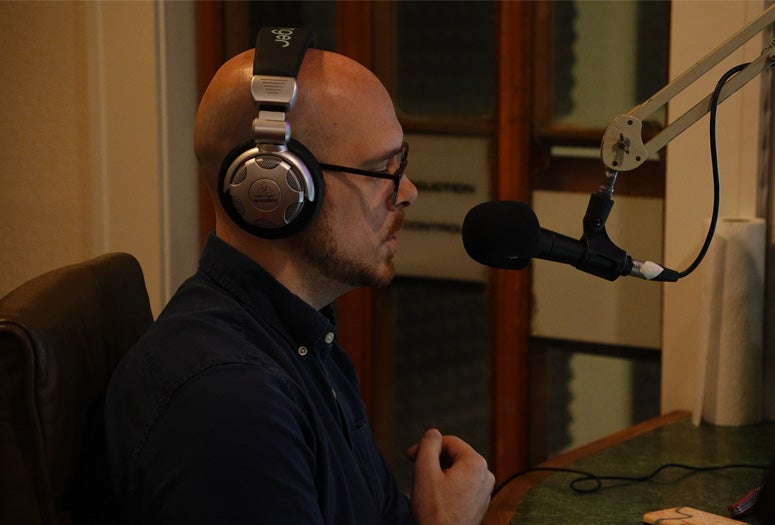Gathered around the microphones in one of KPFT’s Houston studios, Weston Twardowski, Haley Schultz and Alondra Torres discussed the impact of the coal-powered W.A. Parish plant in Fort Bend County for episode 42 of “Gulf Streams.”
“Because the Center for Environmental Studies (CES), where I’m based, has really strong relationships with a number of community organizations, we’re very aware of various things that are happening,” said Twardowski, associate director of CES and a lecturer in environmental studies at Rice University. “Sometimes community partners will reach out and say, ‘Hey, we’ve got an idea for a story’ or ‘We have something we really want to talk about.’”
The weekly radio show produced by KPFT in collaboration with the School of Humanities-hubbed CES and the Rice Sustainability Institute's EcoStudio, has become a vital platform for environmental discourse in and beyond Houston. Since its launch in October 2023, the show has explored a wide range of topics including artists creating work on climate change, urban heat and health risks, Houston’s biodiversity, how urban planning can help fight climate change and the history and environmental impacts of meat production.
“I like to say that the show is about 60% Houston or Texas content and then about 20 to 30% is U.S. content more broadly,” Twardowski said. “The last bit's really thinking globally. So we do think globally on the program and we often are in conversation with scholars and experts from all over the world.”
For episode 42, for example, Donna Thomas and Vero Pina of the Fort Bend Environmental Organization joined the conversation virtually, supplementing the in-studio conversation between Twardowski, Torrez and Schultz.
“I’m very concerned about the public health hazard that Parish poses to the community, to the environment, to the employees there,” said Torres, Air Alliance’s climate justice coordinator, who described the plant as “the most dangerous and polluting coal plant in all of Texas.”
Schultz, a volunteer with the nonprofit organization Public Citizen, reflected on the personal impact of living near such a facility.
“It makes me wonder if I have been impacted? And have I picked the right place for my son to grow up?” said Schultz, a Sugar Land native. “NRG has transitioned other coal plants across the U.S., so we are not asking for something that is impossible.”
Twardowski credited the show’s success to its granular approach to environmental coverage, a niche that is often overlooked.
“This is critical knowledge,” Twardowski said. “This is information that we need to have to keep ourselves safe and to know how we can live our lives in a little bit better, environmentally cleaner way.”
To listen to Gulf Streams, click here.

